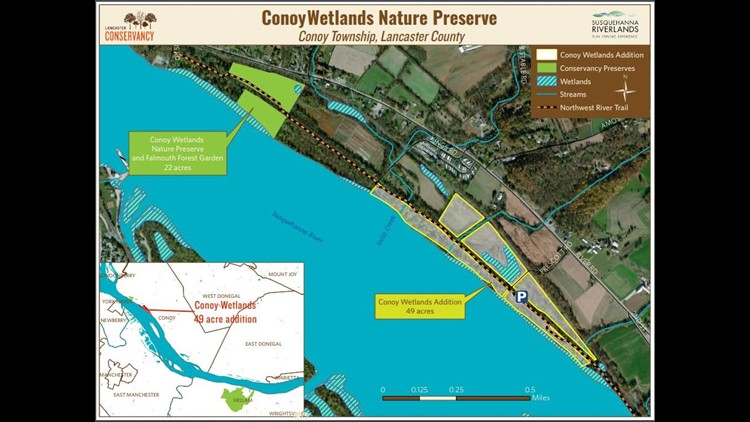LANCASTER COUNTY — The Lancaster County Conservancy announced Thursday it has acquired 49 acres along the Northwest Lancaster County River Trail in Conoy Township, which expands the Conoy Wetlands Nature Preserve to 71 acres.
Also on Thursday, the Conservancy officially opened its Falmouth Forest Garden on the original Conoy Wetlands tract.
The Conservancy said plans to save the 49 acres of forests and wetlands along the Northwest River Trail go back two years, when a public-private partnership was formed to keep the land free of development.
In 2017, the Conservancy says, Talen Energy marketed about 119 acres of forested and agricultural land as a package and was unwilling to sell only the 49 acres of natural land to the Conservancy. In order to keep this land in its natural state, Conoy Township facilitated a partnership with the Lancaster County Solid Waste Management Authority, which agreed to purchase the entire package from the utility, sell the natural 49 acres to the Conservancy once enough public and private dollars were raised to preserve the land, and sell the agricultural land for continued farming.
“This unique partnership with the Conservancy offered a wonderful opportunity for LCSWMA to help protect the environment and improve the livability of the community,” said LCSWMA chief executive officer Bob Zorbaugh in a press release. “We continually look for ways to support and invest in the communities where we have an operational presence, including along the Susquehanna Corridor.”
The Conservancy received a grant from the state Department of Conservation and Natural Resources to acquire the land in 2018. Matching contributions from the Pine Tree Conservation Society, High Foundation, and Brookfield Renewable were critical components to fund the rest of this acquisition, the Conservancy said.
Conoy Township agreed to partner with the Conservancy in management of the land.
All 49 acres will be maintained as a public nature preserve in perpetuity, open to the public year-round, free of charge, the Conservancy said.
“The Conoy Wetlands Nature Preserve is the perfect escape for city residents who want an easy, scenic hike in the woods with views of the Susquehanna River,” the Conservancy said in the release. “The land’s preservation protects a critical section of the Northwest River Trail forever.”
The Northwest River Trail is a 14-mile public recreational trail located along the Susquehanna River. It traverses five municipalities and is available for walking, biking, jogging, cross country skiing, and snowshoeing.
The Northwest River Trail also connects this property to the Conservancy’s 22-acre Conoy Wetlands Nature Preserve just upriver. It was there that, in 2018, the Conservancy implemented Phase I and II of what is believed to be the first forest garden on publicly-accessible natural lands in Pennsylvania.
“Grants that rehabilitate our local ecosystems are important as we look to restore balance in Lancaster County land use,” said Sam Bressi, CEO of LCCF, which provided funding for the project. “Fallow tracts like the wetlands in Conoy Township are a perfect place to do a demonstration garden to help educate folks using the popular Northwest River Trail on the value to our landscape of native fruits and trees that provide both food and habitat.”
Officially opened today, “Falmouth Forest Garden” serves as a demonstration of regenerative agroforestry for strategic natural land management. It hosts 20 native crop-producing species and a supporting groundcover of native herbs and wildflowers.
Accessible off the Northwest River Trail, the restored five-acre floodplain forest within the Conoy Wetlands Nature Preserve is designed to provide long-lived perennial crops such as black walnuts, persimmons, pawpaws, serviceberries, and hazelnuts for improved wildlife habitat. The natural regeneration of black walnut trees and elderberry bushes set the template for restoration efforts and inspired the design by calling attention to the productivity of rich riverside soils.



